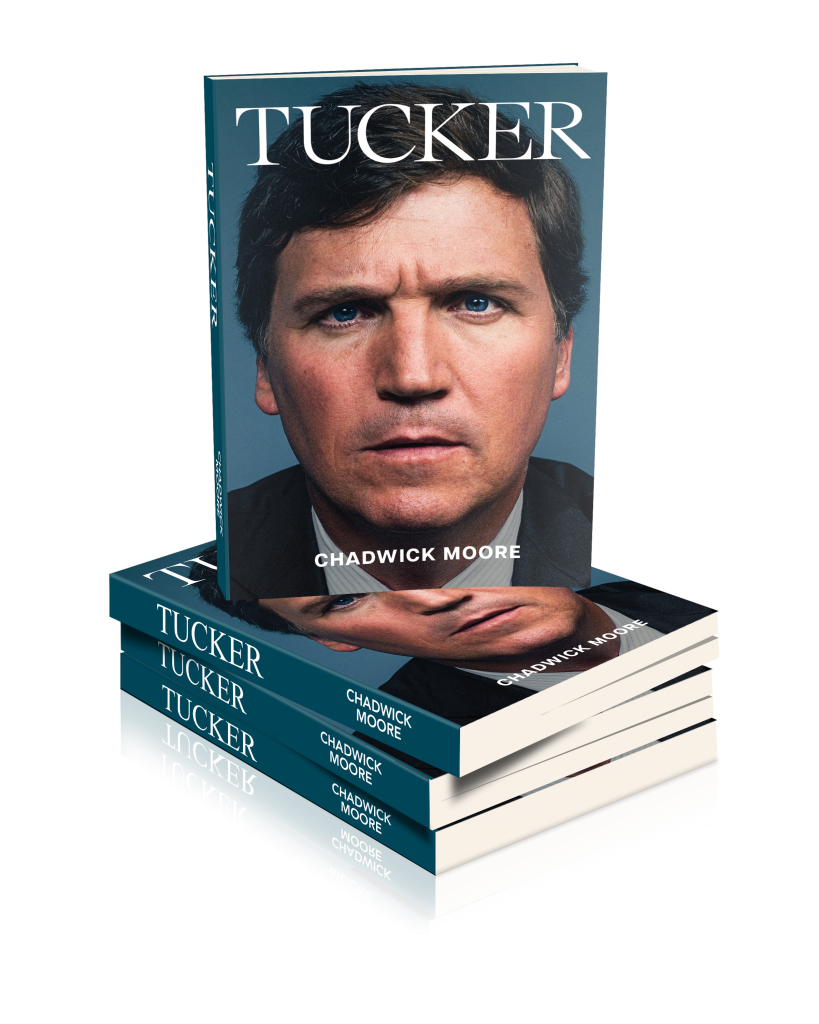Who is Tucker Carlson Off Camera? An EXCERPT From Chadwick Moore’s New Book

 About the Author
About the Author
Chadwick Moore is an author, journalist, and contributing editor at The Spectator. He has written for the New York Times, the New York Post, Playboy, Breitbart, the Advocate and Out magazines, among others. In 2017, Chadwick was fired from his job as editor-at-large for The Advocate and Out magazines and subsequently blacklisted by the left, for penning an article describing his coming out as a conservative. Chadwick was a regular guest on Tucker Carlson Tonight, including appearing on its final episode, and remains a fixture on several Fox News’ programs. Born in Tennessee, he currently resides in Brooklyn, New York.
Excerpt from Tucker by Chadwick Moore
“I would say the takeaway for me, long-term, which really did help form the basis and thinking about everything,” he begins, in a gravelly voice, “is the closer you get to something, the more confusing it tends to become, and the more you realize you don’t understand, and the more the distinctions between the good guys and bad guys become blurry.
“Ortega was an absolute thug. He was completely dictatorial, completely utilitarian, and had secret police and political prisons and killed his opponents. He had super bad supporters.
“But Ortega turned out to be one of the only leaders in the world who didn’t buy the Covid lockdowns. He’s a Marxist authoritarian. He executed his political prisoners. You expect him to jump on Covid immediately as a pretext. No, just the opposite. Nicaragua became a haven for people who didn’t want the vaccine, didn’t want lockdowns. Libertarian left, right, freedom-minded hippies, all kinds of different groups who didn’t buy into the Covid authoritarianism moved to Nicaragua during the pandemic. Friends of mine moved to Nicaragua, and they aren’t liberal at all, they voted for Trump. Explain that to me. It’s just incredible.” He pauses. “It’s like getting a text from Naomi Wolf saying, ‘Thank you for what you’re doing.’ What? Naomi Wolf, the feminist?
“So then, there’s a point in every honest man’s life when you realize, I’m just too old to understand this. All I can do is enjoy it. And, luckily, I don’t need to understand it, I’m just calling it as I see it.”
He tells me he was even more befuddled to learn, a couple years ago, that the left-wing dictator of Venezuela, Nicolás Maduro, was a “mega-fan” of his show, and wanted to meet him.
This document is privileged and confidential and shall not be shared with anyone outside the desired recipient.
“I have a friend who is a lifelong, crazy Marxist — and this person is friends with Nicolás Maduro, and he said, ‘They love you, he watches your show every night.’ I don’t really know what’s happening there, it seems really bad. They’re eating zoo animals, right? Every Venezuelan has lost like twenty pounds due to starvation. I don’t think I support that. It bothered me. I didn’t ask any follow–up questions, because I didn’t want to know.” He laughs.
“So I just put that into my large and growing file of weird phenomena that means something, but I’m not sure what it means. UFOs are in there. Naomi Wolf becoming someone I agree with, I don’t know what that means, either. That’s in that file. But that file, the ‘to be determined’ file in my head, adds at this point to my only analysis that things are changing in a really, really deep way. Not in a bullshit way. Not in a ‘Oh, more Hispanics are voting for Trump,’ shallow way, but there’s actually some huge changes underway the outlines of which are unknown to me.”
Tucker has made abundantly clear over the years that he has little use for politicians, right, left, or in between. But he’s found one even he can get behind, at least for now: Nayib Bukele, the forty-one-year-old president of El Salvador. The smallest nation in Central America and once the murder capital of the Western hemisphere, El Salvador has undergone a sweeping metamorphosis since Bukele was elected in 2019, and declared a state of emergency against the gang violence that once plagued the nation. Since the crackdown, liberal American media like The New York Times and CNN — the same outlets that relentlessly pushed Covid-19 lockdowns and mandatory vaccinations — have fretted over Bukele’s “dangerous bargain of sacrificing civil liberties for safety,” but at home he enjoys a 90 percent approval rating.
After Bukele appeared on Carlson’s evening show, he invited him to Maine to film an hour of Tucker Carlson Today. It was partridge season and Bukele didn’t even know what a partridge was, but with the Salvadoran’s large security contingent in tow, the two went tromping off into the woods. Tucker later shows me a picture of them side by side in hunting gear, Carlson holding his childhood shotgun.
“It’s very easy to create a binary from a distance between good and evil,” he adds now, “these are our allies, these are our enemies. But that’s only possible at a distance, just like anything, just like a marriage. You know, many, many, many times in my life, including this week, I’ve talked to people about their marriages, I give people advice on a marriage and the first round of conversations, you always have a really clear picture about who’s right and who’s wrong. Then the deeper you get into it, you realize it’s actually this kind of very messy mixture of responsibility for the disaster. It’s never as clear as you think it is, ever, because people are just very complicated, super complicated. The more you know the more you realize you don’t know what motivates people.
“I learned that interviewing criminals. I’ve interviewed a lot in writing about crime, interviewed a lot of people convicted of horrifying crimes — rapes, murder. And there’s no excuse for murder. I’m not trying to construct an excuse. But you get into it, and it’s like the motives are always different from what we think they were.
“And everything is more complicated than you think it is, including and especially in wars. I learned that because the Cold War was the easiest story to analyze. It was, like, the atheist communist country versus the West. It wasn’t hard for me and I still feel that way. Living in Washington as a kid, my dad was working for the government and was very engaged in the Cold War, and that feud was a defining feature of my childhood.
“However, the war between the Contras and the Sandinistas was just more complicated than that. Because it was a civil war, it’s never really about ideology. It’s about ideology, plus long-standing blood feuds, plus economics, plus . . . there’s just a lot of different things going on. Plus, of course, it’s always a proxy between two larger powers. And that was the first time I thought, wow, this is actually quite complex.”
He momentarily pauses again. “The Ukrainian and Russian conflict is effectively a civil war. These are like siblings fighting each other. So, it becomes a proxy for a larger power struggle and that was absolutely the case in Nicaragua.
“That, to me, is the beginning of the beginning of wisdom: realizing the limits of wisdom. And the limits of your understanding and the limits of what’s knowable and all that.”





Hey Chadwick,
Congratulations on the book. Can”t wait to read it. I preordered the book from Amazon in May and they keep moving the delivery date out further every week. Is there anyone else seeing the same thing?
Thank you!
Chadwick, I always enjoy your humour and you are among the bravest people I am aware of. Congratulations on this great book!